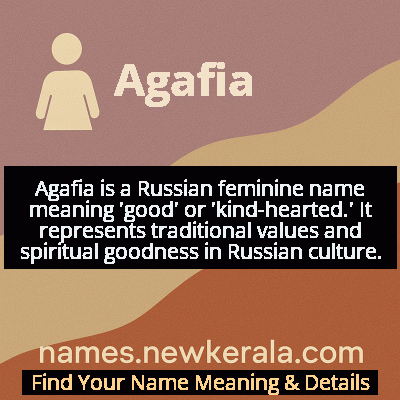Agafia Name Meaning & Details
Origin, Popularity, Numerology Analysis & Name Meaning of Agafia
Discover the origin, meaning, and cultural significance of the name AGAFIA. Delve into its historical roots and explore the lasting impact it has had on communities and traditions.
Name
Agafia
Gender
Female
Origin
Russian
Lucky Number
7
Meaning of the Name - Agafia
Agafia is a Russian feminine name meaning 'good' or 'kind-hearted.' It represents traditional values and spiritual goodness in Russian culture.
Agafia - Complete Numerology Analysis
Your Numerology Number
Based on Pythagorean Numerology System
Ruling Planet
Neptune (Ketu)
Positive Nature
Intuitive, analytical, spiritual, and inquisitive.
Negative Traits
Secretive, reserved, aloof, and can be overly critical.
Lucky Colours
Green, yellow.
Lucky Days
Monday.
Lucky Stones
Cat’s eye, moonstone.
Harmony Numbers
1, 5, 6.
Best Suited Professions
Scientists, researchers, spiritual leaders, detectives.
What People Like About You
Depth of knowledge, analytical skills, spirituality.
Famous People Named Agafia
Agafia Lykova
Hermit
Last surviving member of isolated Siberian Old Believer family
Agafia Karpovna
Religious Figure
19th century Old Believer nun and spiritual leader
Agafia of Rus
Royalty
12th century princess who strengthened political alliances through marriage
Agafia Semyonovna
Folk Healer
18th century herbalist documented in Russian folk medicine
Name Variations & International Equivalents
Click on blue names to explore their detailed meanings. Gray names with will be available soon.
Cultural & Historical Significance
The name's cultural journey reflects broader Russian historical narratives—from medieval piety through imperial transformations to Soviet secularization and post-Soviet rediscovery of heritage. During the Soviet period, Agafia became rare as it represented 'backward' traditional values conflicting with communist ideology. However, its persistence in certain communities, particularly rural and religious ones, ensured its survival. Today, the name is experiencing a modest revival as Russians reconnect with their pre-Soviet heritage, making Agafia a symbol of cultural continuity and the enduring power of tradition in Russian identity.
Extended Personality Analysis
Women named Agafia are traditionally perceived as possessing deep inner strength, spiritual depth, and practical wisdom. The name suggests a personality characterized by resilience, moral conviction, and a strong connection to tradition. These individuals are often seen as the bedrock of their families and communities—reliable, nurturing, and guided by strong principles. Their strength is typically quiet rather than overt, manifesting as endurance through difficult circumstances and steadfast commitment to their values. The historical association with Old Believers adds a dimension of spiritual perseverance, suggesting someone who maintains their beliefs despite external pressures.
In interpersonal relationships, Agafias are often described as warm yet reserved, possessing a dignified demeanor that commands respect. They tend to be excellent listeners and practical problem-solvers, drawing on both traditional wisdom and personal experience. Their personality combines compassion with practicality—they're the type to offer both emotional support and concrete help. The name suggests someone who values authenticity over superficiality, and who finds strength in their cultural and spiritual roots. While they may appear traditional, they often possess a quiet adaptability that allows them to navigate changing circumstances while maintaining their core identity.
Modern Usage & Popularity
In contemporary Russia, Agafia occupies a niche position as a traditional name experiencing gradual rediscovery rather than widespread popularity. While it remains outside the top names lists, it has seen increased usage since the 1990s as part of the broader post-Soviet revival of traditional Russian names. The name is most commonly chosen by families with strong connections to Russian Orthodoxy, particularly Old Believer communities, or by parents seeking unique names with deep cultural resonance. Urban usage remains limited but has grown slightly among educated families interested in historical and literary names. Demographic data shows the name is more prevalent in certain regions with strong traditional communities, such as parts of Siberia and the Russian North. The name's rarity in modern times adds to its appeal for parents seeking distinctive yet meaningful names, though its traditional associations mean it's less likely to appear in cosmopolitan naming trends.
Symbolic & Spiritual Meanings
Agafia carries rich symbolic meaning as a representation of Russian cultural endurance and spiritual integrity. The name symbolizes the continuity of Russian tradition through centuries of upheaval, serving as a living connection to pre-modern Russian identity. Metaphorically, it represents the 'good soul' of Russia—the enduring values of faith, family, and cultural memory that persisted through Soviet atheism and rapid modernization. The name's association with Old Believers adds layers of meaning related to religious perseverance and resistance to forced cultural change. Symbolically, Agafia embodies the concept of 'rootedness'—being firmly planted in one's cultural and spiritual heritage while navigating contemporary life. It represents the quiet strength found in tradition and the power of cultural memory to sustain identity through historical transformations. The name serves as a symbolic guardian of Russian spiritual and cultural values, reminding bearers of the depth and resilience of their heritage.

